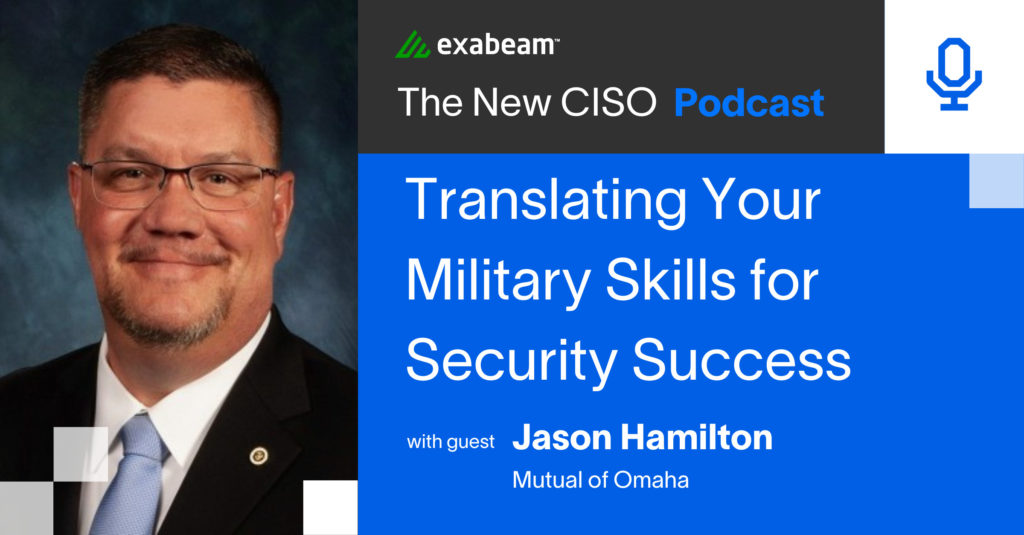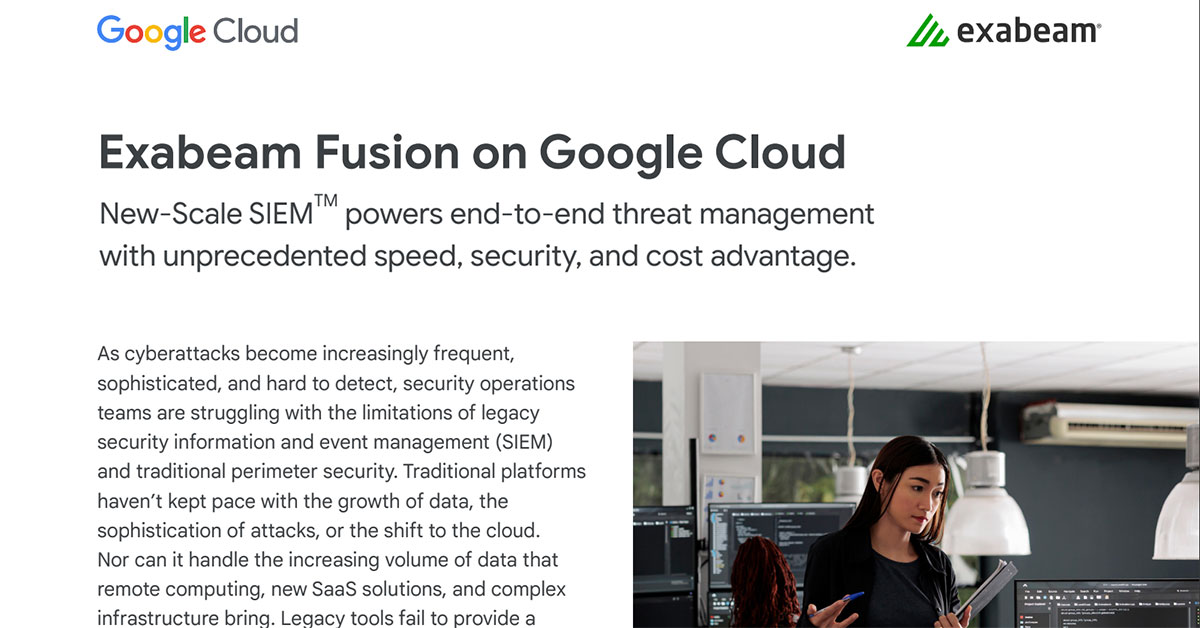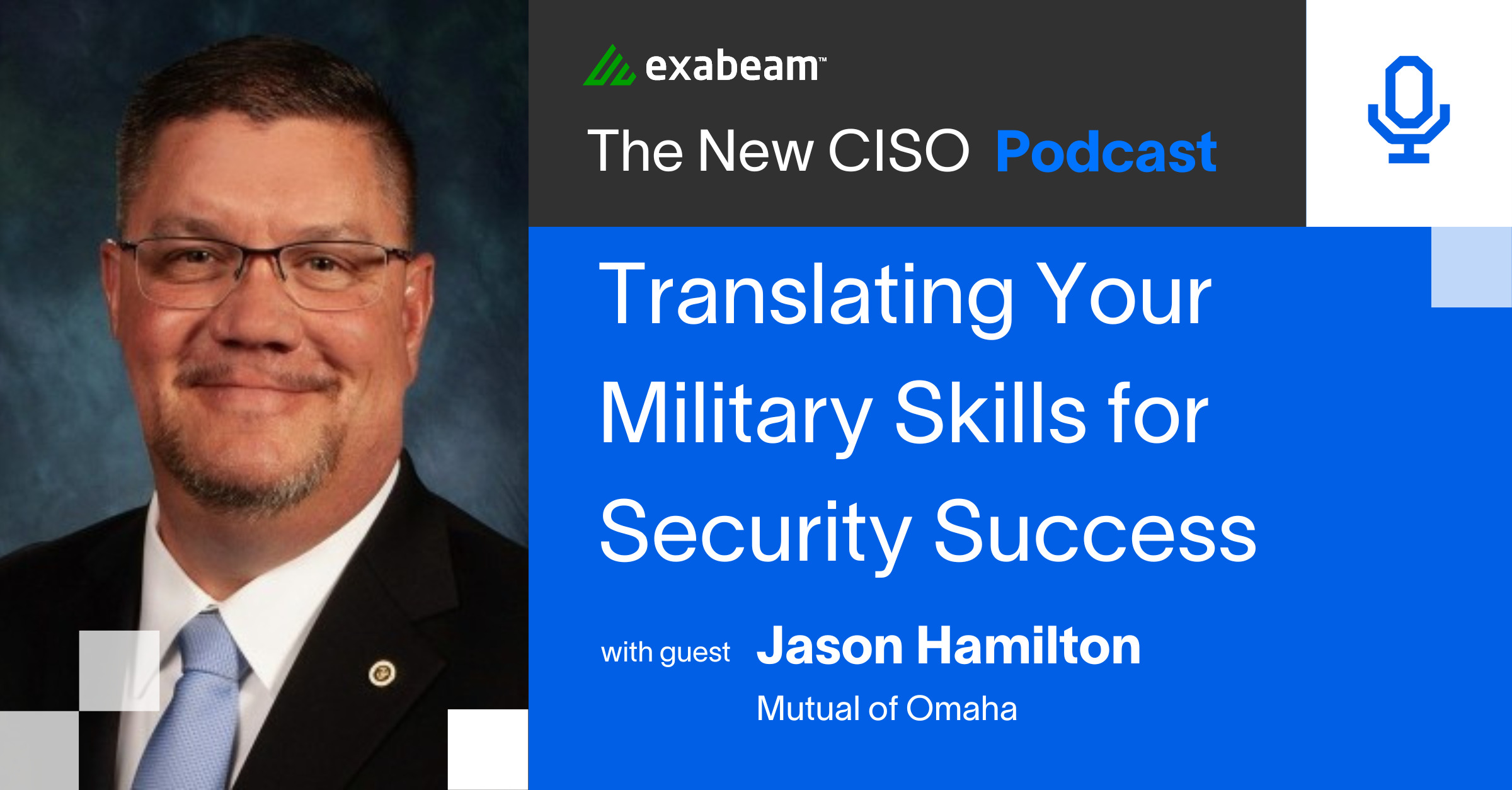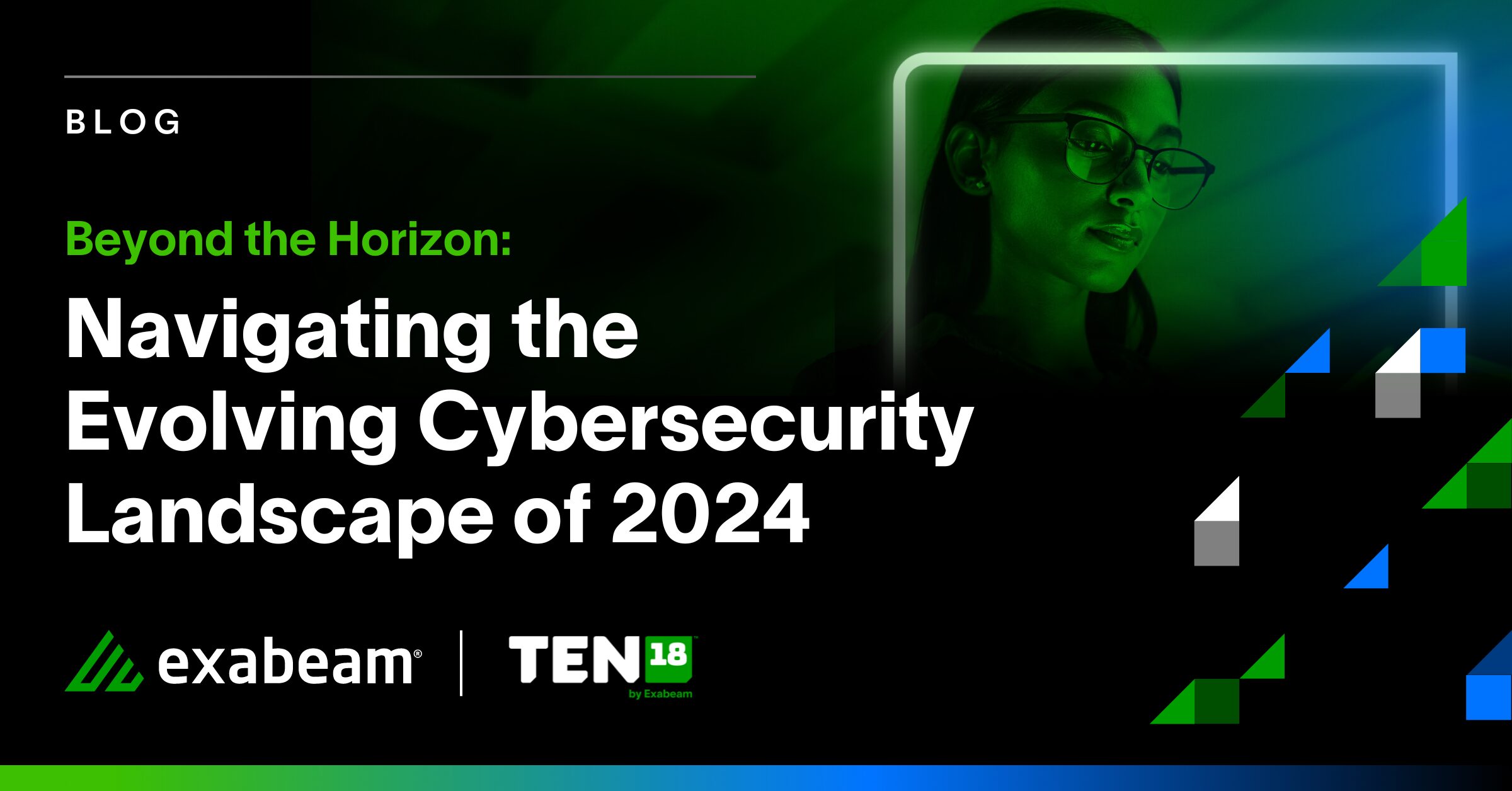In this episode of The New CISO, Steve sits down with Jason Hamilton, the Chief Information Security Officer (CISO) of Mutual of Omaha, to explore the link between a military background and success in the security sector. With 22 years of service in the U.S. Marine Corps under his belt, Jason was able to transition his expertise into the cybersecurity field. He shares valuable insights and lessons he gained throughout his journey that have helped shape his current career.
In this article:
- How the Marine Corps prepared Jason for the corporate world
- Advice for officers looking to go into civilian work
- Differences between the military and the corporate world
- Making the most of corporate mentorship
- What being a new CISO means to Jason
How the Marine Corps prepared Jason for the corporate world
As a Communications Systems and Information Officer in the Marine Corps, Jason quickly learned about the significance of information technology and cyber in the military. He took on an instructor role and had to broaden his horizons by taking civilian classes to ensure he could adequately train other officers on information and data. As he rose through the ranks, working with data remained a key part of his career. Jason eventually became a specialist in cyber, formerly known as Information Assurance, and saw it become a priority for the Marine Corps.
Jason reflects on his last ten years in the Marine Corps, stating, “I don’t believe there’s such a thing as a perfect leader. You have to learn from those mistakes. You can’t make those mistakes twice, or you’re not going to make it.” He emphasizes the importance of refining leadership skills and managing efficiently, two essential qualities that he believes are crucial for a high-ranking officer.
Looking back on his military career, He says, “Although when you’re going through it at the time, you may not agree with some of the direction because you’re not in charge — you just know they’re called orders for a reason. They’re not called options. Sometimes you see those orders, and are thinking ‘What? I’ve got to go where and do what?’ But then when I look back on that, I can tell you every single assignment that I had in the Marine Corps helped set me up for success to not only transition into the corporate world, but to excel in the corporate world.”
Advice for officers looking to go into civilian work
When asked for advice he can give other officers looking to transition into corporate work, Jason says, “You need to learn to humble yourself. The military has a way of showing you how important you are through fitness reports, the rank you get, and things like that. In the corporate world, it doesn’t work like that. When I was going to enter the corporate sector, nobody cared whether I was a lieutenant colonel.”
Jason gives advice on the things you should include in a resume, stating, “When it comes to resume writing, you’re used to reading or writing fitness report bullets for your service members. That doesn’t tell us, the ‘so what?’ In the civilian world, all they care about is the ‘so what?’ What are you going to do for me? The first thing an HR or hiring manager’s going to say, is ‘So what does that mean to me?’” It’s important to describe how each bullet point on your resume made an impact.
Differences between the military and the corporate world
Jason speaks about the differences between military and corporate cultures. According to Jason, one of the biggest challenges for military veterans transitioning into the corporate world is adjusting to a different personality style. “Most people that come out of the military are type A personalities,” he says. “Not everybody in the corporate world’s a type A personality. You need to recognize that there are other personality styles that do get results besides Type A.”
Another difference Jason points out is empathy, a quality that is not emphasized in the military. “Empathy didn’t exist — that word never existed in my vocabulary in the military for the most part. I had to learn that really quickly in the corporate world.” Jason said.
When it comes to problem-solving, the military and corporate worlds have different approaches. In the military, quick problem-solving is important, but in the corporate world, Jason says, “it’s better if you don’t solve the problem. Let your team solve the problem. You’re there to provide them direction, provide them guidance, and to remove obstacles for them. Then you’re there to celebrate their successes with them and then help them grow as a team and help them grow individually because they too have career aspiration goals.”
Making the most of corporate mentorship
When transitioning into the corporate world, Jason found value in participating in a mentorship program. He explains his approach, stating, “I quickly figured out that I was going to have to drive the conversation. After our very first meeting, I decided I’m going to have an agenda and I’m going to send it to him two weeks ahead of time, and list the things I want to get out of our next session.”
Jason also shares how he leveraged his mentorship, saying, “Let’s start with the resume. ‘This is what my resume looks like. Can you take a look at that?’ And he gave me pointers, but he also would take that back to the HR department and they would red line it for me and bring it back.”
When asked what officers should gain from a corporate mentorship program. Jason provides a list of important topics:, “If I had to rip off a list of things that you want to get out of a mentorship program transitioning into the corporate world, it would be resume writing skills, how to negotiate compensation, and understanding the corporate culture. Leadership — what does leadership look like in the corporate world versus what you’ve seen in the military? The last thing would be planning and budgeting.”
What being a new CISO means to Jason
As a new CISO, Jason sees his role as a chance to give back to his company and associates while also continuing to develop his leadership skills. According to Jason, being a new CISO means “giving back to my company, giving back to our associates, and continuing my leadership journey. Leadership is never over. You’re never done and you’re never perfect. So continuing to hone those skills and passing those on to others who will come after and make it even better once I leave.”
Listen to the Podcast
For more insights, listen to the podcast or read the transcript.

Similar Posts
Recent Posts
Stay Informed
Subscribe today and we'll send our latest blog posts right to your inbox, so you can stay ahead of the cybercriminals and defend your organization.
See a world-class SIEM solution in action
Most reported breaches involved lost or stolen credentials. How can you keep pace?
Exabeam delivers SOC teams industry-leading analytics, patented anomaly detection, and Smart Timelines to help teams pinpoint the actions that lead to exploits.
Whether you need a SIEM replacement, a legacy SIEM modernization with XDR, Exabeam offers advanced, modular, and cloud-delivered TDIR.
Get a demo today!












